AS we approach the New Year, we look back at the hard-hitting events that made the headlines this year.
Much has happened over the past 12 months and as December draws to a close there is much to reflect on.
Here are some of the headline-grabbing events that shaped 2023...
Catholics in mourning
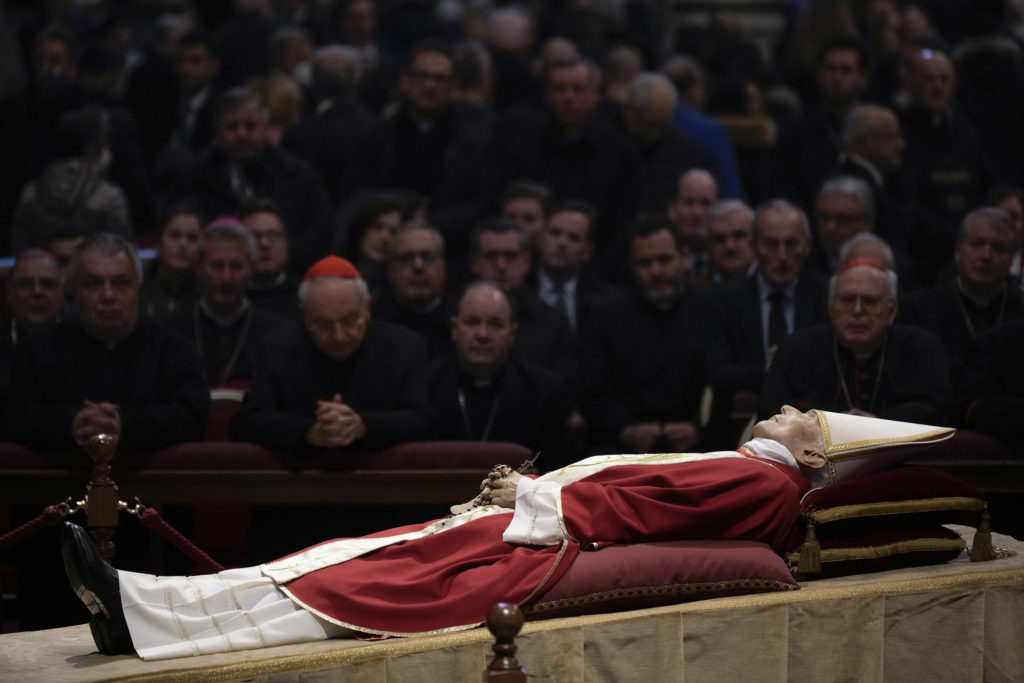 The body of Pope Emeritus Benedict XVI lies in state at St. Peter's Basilica on January 04, 2023 in Vatican City
The body of Pope Emeritus Benedict XVI lies in state at St. Peter's Basilica on January 04, 2023 in Vatican CityThere was a sombre start to 2023 with Catholics across the world mourning the death of Pope Benedict.
Irish President Michal D Higgins and Taoiseach Leo Varadkar were among the Irish figures to pay tribute to Pope Emeritus Benedict who died on December 31, 2022, aged 95.
The former Pontiff passed away at the Mater Ecclesiae Monastery, where he had resided since resigning the papacy in 2013.
His funeral took place on Thursday, January 5, presided over by Pope Francis.
While offering his condolences, President Higgins said Pope Benedict had a “steadfast interest” in peace in Northern Ireland.
"It is with sadness that Catholics around the world will have learned of the death of Pope Emeritus Benedict XVI," said the President at the time.
"At this time of the return of war on our continent and in so many areas of the world, he will be remembered for his untiring efforts to find a common path in promoting peace and goodwill throughout the world, including a steadfast interest in peace in Northern Ireland."
He added: "Of particular importance was that during his tenure, Pope Benedict sought to highlight both the common purpose of the world's major religions and his injunctions as to how our individual responsibilities as citizens require the highest standards of ethics in our actions."
Pope Benedict was the first Pope in nearly 600 years to resign from the position, a decision he made due to his declining health.
The Pope Emeritus' body laid in state in St Peter's Basilica for three days at the start of the year, in an open casket resting in front of the Altar of the Confession, before his funeral.
The faithful were permitted to enter the Basilica to pay their final respects and to offer prayers for the repose of his soul.
Attempted murder of police officer
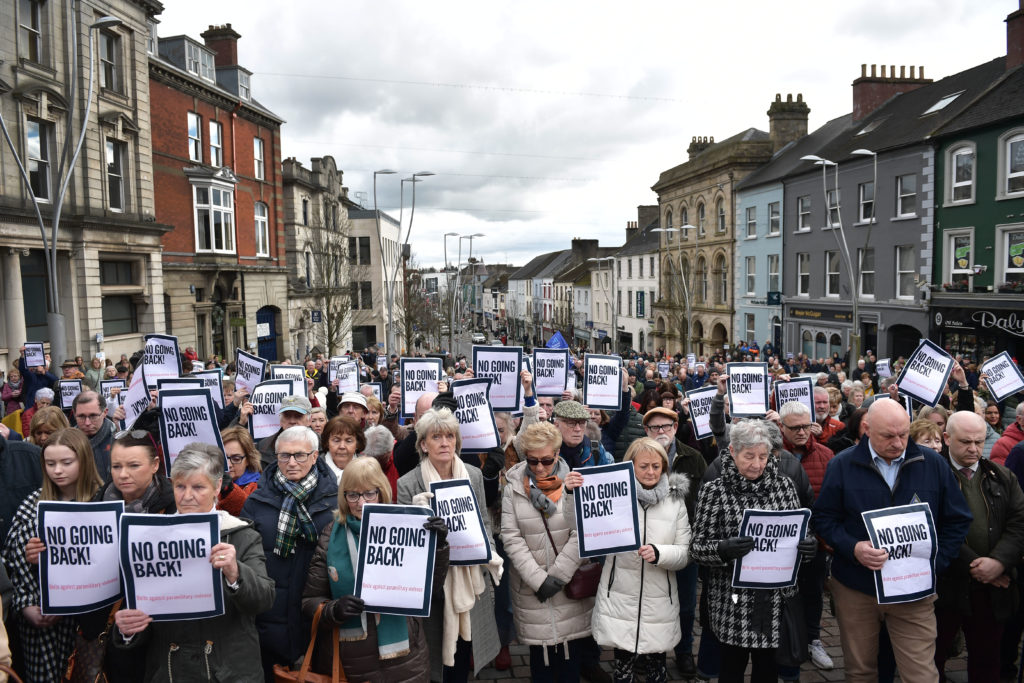 A rally is held in support of off duty Detective Chief Inspector John Caldwell who was shot while attending a football coaching session with his son on February 25, 2023 in Omagh
A rally is held in support of off duty Detective Chief Inspector John Caldwell who was shot while attending a football coaching session with his son on February 25, 2023 in OmaghWhen an off-duty policeman was shot several times in front of his son in February the attack sent shockwaves across Britain and Ireland.
The PSNI launched an attempted murder investigation after senior officer Detective Chief Inspector John Caldwell was targeted in Omagh, Co. Tyrone on February 22.
The officer was off-duty at the time of the attack, which took place at around 8pm at a sports complex in the Killyclogher Road area, where he had been coaching a local youth sports team.
Politicians across Britain and Ireland were quick to condemn the incident, with British Prime Minister Rishi Sunak stating: “I am appalled by the disgraceful shooting of an off-duty police officer in Omagh.
“My thoughts are with the officer and his family. There is no place in our society for those who seek to harm public servants protecting communities.”
Taoiseach Leo Varadkar called the attack a “grotesque act”.
“I am appalled by the disgraceful shooting of an off-duty police officer in Omagh,” he said in a statement.
DCI Caldwell sustained life changing injuries but was eventually released from hospital in April.
He made his first public appearance following the incident in May when he attended a garden party in Co. Down hosted by King Charles.
Seven men have been charged with attempted murder in connection with the shooting.
Two of the men, aged 38 and 45, have also been charged with membership of a proscribed organisation, namely the IRA.
Three of the men, aged 28, 33 and 47, have also been charged with the preparation of terrorist acts.
American tourist attacked
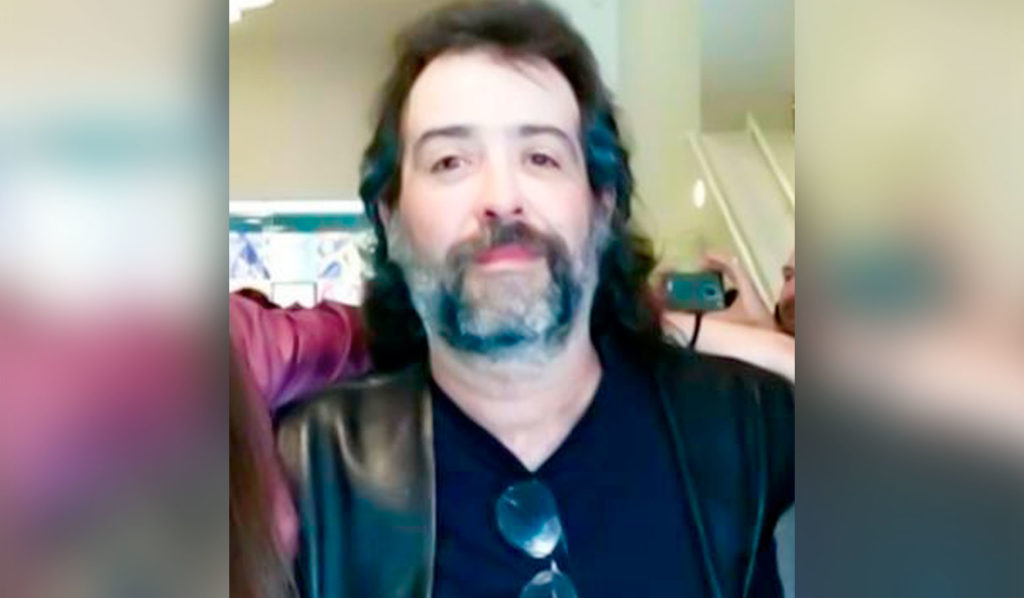 US tourist Stephen Termini was assaulted in Dublin
US tourist Stephen Termini was assaulted in DublinShock reverberated across the global Irish community when a US tourist was attacked while holidaying in Ireland.
Stephen Termini, 57, was hospitalised and left with life-altering injuries after being set upon by a group of people in Dublin in July.
The attack, which happened on the corner of Store Street and Talbot Street on July 19, made headlines around the world.
It sparked national outrage and opened up a major conversation about safety in Dublin city centre.
In a statement made while he was still in a serious condition in hospital, Mr Termini's older sister Michelle confirmed he had been visiting Ireland to trace his roots and to visit his mother's resting place.
"He had always dreamed of visiting Ireland," she said.
"He was trying to trace our family that emigrated to the US from Dublin."
She added: "We feel so very helpless as none of us can afford the trip to be with him in his time of dire need."
Speaking after the incident, Sinn Féin justice spokesperson Pa Daly stated: “This savage attack has no place in our society.
"Unfortunately, these kinds of attacks are becoming increasingly common in our capital city, and people and communities are at the end of their tether,” he added.
Mr Termini, who hails from Buffalo in New York, fought for his life while in a coma in Dublin’s Beaumont Hospital and eventually pulled through.
He is now back home and recovering well.
Following the attack, Ireland’s Minister for Justice Helen McEntee spoke with gardaí forces in the capital and discussed recruiting more guards.
"There is no excuse for violence on our streets and those responsible will be brought to justice,” she said.
Three teenagers who have been charged in connection with the incident are awaiting directions from the Director of Public Prosecutions in their cases.
Two teens die in Greek tragedy
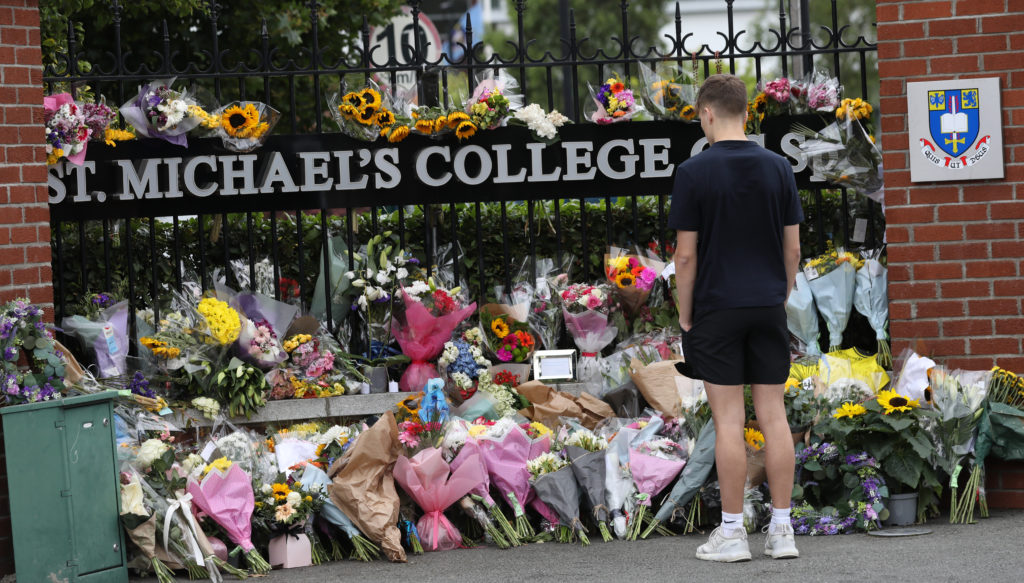 Hundreds of flowers left at St Michael's College in Ballsbridge, which tragic students Max Wall and Andrew O Donnell both attended
Hundreds of flowers left at St Michael's College in Ballsbridge, which tragic students Max Wall and Andrew O Donnell both attendedTragic teenagers Andrew O’Donnell and Max Wall died while on holiday together in Greece in July.
The friends died in separate incidents on Sunday, July 2, during a post-leaving cert trip on the Greek island of Ios with fellow classmates.
Both aged 18, they had recently graduated from St Michael’s College in Dublin, which hosted numerous memorial events following their untimely death.
The pair were among a group of more than 80 students from the Ballsbridge secondary school who travelled to the island following their exams.
Andrew died after falling on a rocky hill near the island’s main town of Hora while walking home from an evening out.
His body was discovered on Sunday, July 2.
Later that day Max collapsed near the island’s port and was pronounced dead.
Max’s parents Niall and Fiona and his older brother Charlie all spoke at his funeral Mass.
During the emotional ceremony St Michael’s school chaplain Father Paddy Moran told the congregation that the popular teenager had been on the phone to his dad when he collapsed.
“He died listening to the voice of a father who loved him,” Fr Moran said, adding: “Max died as he lived, loving those around him.”
Paying tribute to their son, Max’s family said: “Our beloved Max was taken from us far too soon. The world has lost a little colour”.
Describing the 18-year-old as having a “larger than life personality” they explained how he “brought great joy to the lives of his family and friends and everyone he came in contact with”.
“During his short time, he faced numerous challenges that he bore with great courage and bravery and always remained his most positive sunny fun-filled self,” they added.
Fr Moran also presided over Andrew’s funeral, which was held the following day.
“Had things been different who knows where his life might have brought him. For some unfathomable reason that we will never understand that promising future was cruelly taken from Andrew,” Fr Moran said during the service.
“A simple fall on a mountaintop took his dreams, his hopes, and his ambitions,” he added.
Speaking during the Mass, Andrew’s father Gavin said his family couldn’t be prouder of him and the man he became, and they will miss him dearly.
“Andrew will remain forever young in our hearts, he will never be forgotten, and his memory we will always cherish,” he said.
Horror on Ireland’s roads
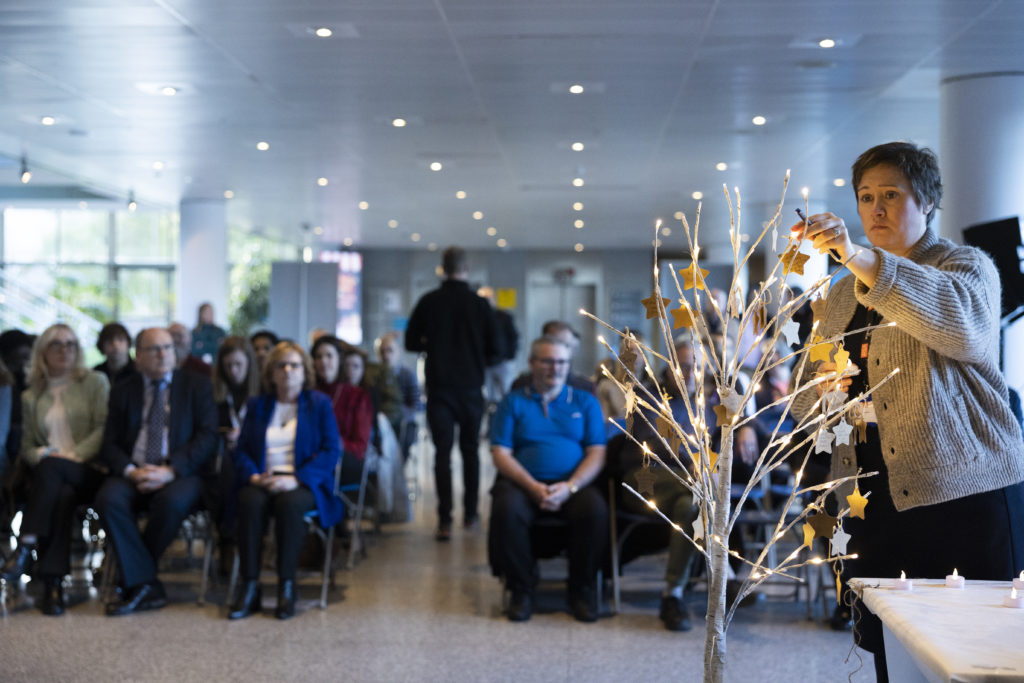 Members of Dublin City Council and the Emergency Services mark World Day of Remembrance for Road Traffic Victims at Dublin City Council's Civic Offices in November
Members of Dublin City Council and the Emergency Services mark World Day of Remembrance for Road Traffic Victims at Dublin City Council's Civic Offices in NovemberSadly, a series of horror accidents took place on Irish roads this year, claiming the lives of more than 130 people in the most tragic of circumstances.
In August Ireland’s Road Safety Authority (RSA) confirmed 100 road deaths had been recorded up to August 1 - 11 more than during the same period the previous year, and the highest number since 2017.
The alarming figures were released as the devastated families of two teenage girls, who were killed in a car crash while travelling to a debs ball, were still coming to terms with the tragedy.
Close friends Kiea McCann, 17, and Dlava Mohammed, 16, lost their lives when the vehicle they were travelling in collided with a tree just outside Clones in Co. Monaghan on the evening of July 31.
The following month tragedy struck Tipperary when four young people died in a collision in Clonmel.
Friends Zoey Coffey, Nicole Murphy and Grace McSweeney, all aged 18, and Grace’s 24-year-old brother Luke McSweeney, were killed when their car overturned and hit a wall.
The teenagers were on their way out to celebrate their Leaving Cert results.
Less than a week later two grandparents and their three-year-old grandson died in another devastating accident in Tipperary.
Thomas O'Reilly, 45, Bridget O'Reilly, 46, and Tom O'Reilly, aged three, lost their lives when the car they were travelling in struck a wall in Cashel.
In a sobering statement released alongside the latest road death data, the RSA admitted it was "losing momentum" in regard to road safety, "with tragic consequences".
In September - at which point 130 people had died on Ireland’s roads - the government confirmed it would be imposing new speed limit restrictions across the country,
“Every single death is a tragedy for the victims’ families, friends and community,” the Department for Transport said.
“Reducing speed has been fundamentally proven to significantly reduce the risk of death or serious injury in road collisions,” they added.
Life sentence for Ashling’s murderer
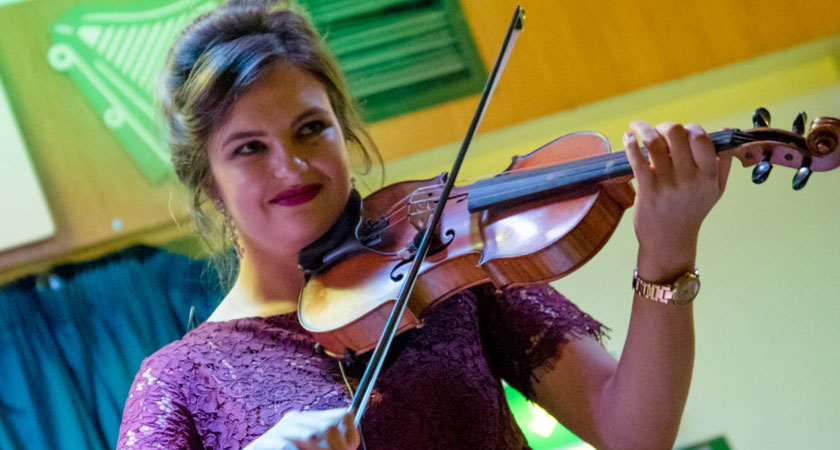 Ashling Murphy's killer received a life sentence in November
Ashling Murphy's killer received a life sentence in NovemberThe man who murdered young teacher Ashling Murphy in a random attack was sentenced to life behind bars in November.
Jozef Puska was given the mandatory life sentence at the Central Criminal Court in Dublin on November 19 after being found guilty of the 23-year-old's murder the previous week.
The 33-year-old stabbed Ms Murphy 11 times in broad daylight as she jogged alongside the Grand Canal in Tullamore, Co. Offaly on the afternoon of January 12, 2022.
Before the sentence was delivered, the court heard victim impact statements from Ms Murphy's partner, sister and mother, who revealed "my heart broke the moment I heard the bad news that Ashling was murdered”.
Puska, who claimed during the trial that he was trying to come to Ms Murphy's aid when she was attacked by another assailant, has never explained why he killed the young teacher.
After the jury returned their unanimous guilty verdict on Thursday, November 9, Mr Justice Tony Hunt described Puska's version of events as “nonsense”.
In his statement to the court, Ms Murphy's partner Ryan Casey revealed how their plans to move in together, marry and have a family were snatched away by Puska.
“It's a pain that I cannot describe," he said.
"I never knew that there was a pain as severe and long-lasting as the physical and emotional pain that comes with losing the most important person in your life, especially in such a horrific, senseless and just beyond evil act by such an insignificant, lowest-of-the-low waste of life."
Riots devastate Dublin
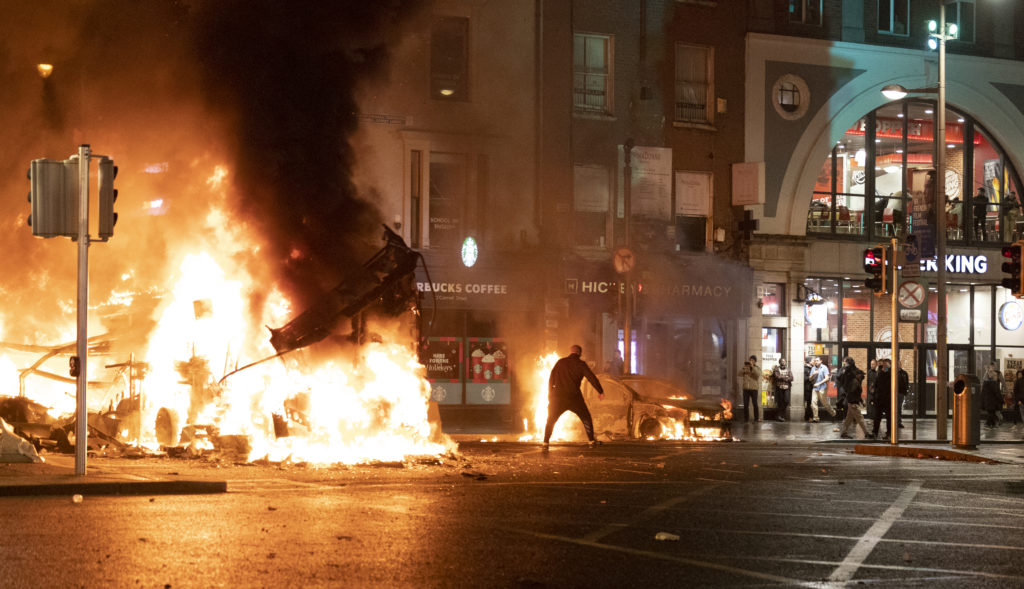 Dublin was devastated by rioting and looting following a stabbing attack outside a school in November
Dublin was devastated by rioting and looting following a stabbing attack outside a school in NovemberA night of riots erupted in Dublin last month after a stabbing attack outside a city centre school left three children and a teacher hospitalised.
Violence broke out in the city’s streets hours after the shocking attack took place outside Gaelscoil Coláiste Mhuire in Parnell Square at around 1.30pm on November 23.
Two girls aged five and six were injured, as well as a five-year-old boy and a female teacher aged in her 30s.
The teacher and the five-year-old girl remain in hospital, but the other two children have since been discharged.
A man aged in his 50s, who was also hospitalised following the attack, is a person of interest to Gardaí, the police force confirmed.
He remains in hospital where police are waiting medical clearance to interview him.
Some 34 people were arrested in Dublin following the disorder which broke out following the incident.
Violence flared across the city well into the night as rioters set fire to vehicles, damaged properties and set upon police officers.
Garda Commissioner Drew Harris described the carnage as “scenes that we have not seen in decades”, before blaming far-right organisations for causing the disorder.
“What is clear is that people have been radicalised through social media and the internet," he said, while branding those responsible as “a complete lunatic faction driven by far-right ideology”.
Over 400 garda officers were deployed to patrol the disorder in Dublin, which saw seven vehicles - three buses, three Garda patrol cars and one Luas tram - all set on fire.
Eight other Garda vehicles were “extensively damaged” the force confirmed, while 13 properties were "substantially damaged" by rioters.
One Garda officer who was seriously injured received treatment in hospital, while many others were injured by missiles thrown at them.
Of those arrested, thirty-two people were charged.
Taosieach Leo Varadkar branded the rioters “criminals, filled with hate”, before adding that they had “brought shame on Ireland”.
President Michael D Higgins said the stabbing incident was “appalling” but added “that it would be used or abused by groups with an agenda that attacks the principle of social inclusion is reprehensible and deserves condemnation by all those who believe in the rule of law and democracy”.

